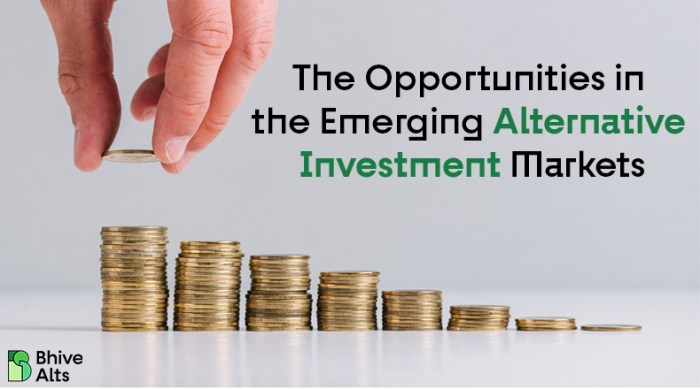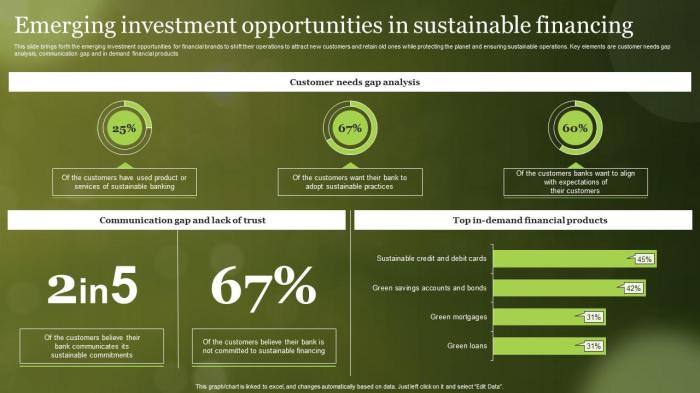
Embark on a journey into the realm of Emerging Investment Opportunities, where the landscape of financial growth is ever-evolving and ripe with potential. From cutting-edge technologies to sustainable energy solutions, discover the promising ventures that await savvy investors in today’s dynamic market.
Delve deeper into the realms of investment advice, personalized strategies, and the crucial role of investment banking. Uncover the secrets to aligning your investment horizon with your goals and navigating the world of emerging markets with confidence. Join us as we unravel the mysteries of profitable investments and unlock the doors to a wealth of new possibilities.
Investment Advice
Seeking professional investment advice is crucial for making informed decisions in the financial market. Financial advisors and experts can provide valuable insights and recommendations based on their expertise and experience.Considering your risk tolerance is essential when following investment advice. Risk tolerance refers to your ability and willingness to withstand fluctuations in the value of your investments. It is important to communicate your risk tolerance to your advisor so they can tailor their recommendations accordingly.Investment advice can greatly impact your decision-making process.
It can help you identify opportunities, manage risks, and achieve your financial goals effectively. By following sound investment advice, you can make informed decisions that align with your investment objectives and risk tolerance.
Investment Advisor
An investment advisor plays a crucial role in helping individuals create personalized investment strategies tailored to their financial goals and risk tolerance. By analyzing market trends, assessing risk factors, and understanding the client’s financial situation, an investment advisor can recommend suitable investment opportunities to maximize returns while managing risk effectively.
Qualifications and Certifications
When choosing an investment advisor, it is essential to look for certain qualifications and certifications to ensure expertise and credibility. Some key certifications to consider include Certified Financial Planner (CFP), Chartered Financial Analyst (CFA), and Chartered Investment Counselor (CIC). These certifications demonstrate a commitment to professionalism, ethical standards, and a high level of expertise in financial planning and investment management.
Robo-Advisors vs. Human Investment Advisors
Robo-advisors are automated platforms that use algorithms to create and manage investment portfolios based on predefined criteria. While robo-advisors offer convenience and lower fees compared to human advisors, they may lack the personalized touch and human insight that a human advisor can provide. Human investment advisors, on the other hand, offer personalized advice, emotional support, and a deeper understanding of the client’s unique financial goals and preferences.
They can provide tailored investment strategies and ongoing support to navigate market fluctuations and changes in the client’s financial situation effectively. Ultimately, the choice between robo-advisors and human investment advisors depends on individual preferences, financial goals, and the level of personalized attention desired.
Investment Banking

Investment banking is a specialized division within the financial sector that provides a wide range of financial services to corporations, governments, and other institutions. The primary functions of investment banks include advising clients on mergers and acquisitions, underwriting new debt and equity securities, and facilitating capital raising through the issuance of securities.
Capital Raising for Businesses
Investment banks play a crucial role in helping businesses raise capital by issuing stocks or bonds. They assist companies in structuring the offering, determining the appropriate pricing, and marketing the securities to potential investors. Through initial public offerings (IPOs) or secondary offerings, investment banks help businesses access the capital markets and raise funds for expansion, acquisitions, or other strategic initiatives.
Mergers & Acquisitions
Investment banks are key players in facilitating mergers and acquisitions (M&A) transactions. They provide advisory services to companies looking to buy or sell other businesses, assisting in valuation, negotiation, and deal structuring. Investment banks also help in securing financing for M&A transactions, whether through debt or equity offerings. Additionally, they play a critical role in identifying potential targets or buyers, conducting due diligence, and navigating regulatory requirements to ensure a successful deal.
Investment Horizon

The investment horizon refers to the length of time an investor plans to hold an investment before selling it. It plays a crucial role in determining the risk level, return potential, and overall investment strategy.Short-term investment horizons typically range from a few days to a few months. Investors with short-term horizons are often looking to capitalize on quick market movements or take advantage of specific opportunities.
This approach can be riskier due to the volatility of short-term markets.On the other hand, long-term investment horizons extend for several years or even decades. Long-term investors are focused on achieving their financial goals over an extended period, such as retirement planning or wealth accumulation. Long-term investments tend to be less affected by short-term market fluctuations.
Aligning Investment Horizon with Financial Goals
When aligning investment horizon with financial goals, it is essential to consider the following strategies:
- Define Clear Objectives: Clearly define your financial goals and the timeframe in which you aim to achieve them. This will help determine whether a short-term or long-term investment horizon is more suitable.
- Diversify Portfolio: Diversification can help balance risk and return potential, depending on your investment horizon. Short-term goals may require a more conservative approach, while long-term goals can benefit from a diversified portfolio.
- Regularly Review and Adjust: Monitor your investments regularly and adjust your strategy as needed to stay aligned with your financial goals. Reassess your investment horizon based on changing circumstances or market conditions.
Investment Opportunities
When it comes to investing, there are plenty of opportunities in various sectors that can potentially yield significant returns. It’s crucial to identify emerging trends and industries that show promise for growth and innovation. In this section, we will explore some of these investment opportunities, along with the associated risks and rewards.
Technology Sector
The technology sector is constantly evolving, offering exciting investment prospects for those willing to take calculated risks. Companies involved in artificial intelligence, cloud computing, cybersecurity, and e-commerce are particularly attractive to investors. The potential for high returns in this sector is substantial, but it’s essential to carefully assess the risks involved, such as rapid changes in technology and intense competition.
Healthcare Sector
The healthcare industry is another promising area for investment, especially with the growing demand for innovative medical solutions and treatments. Biotechnology, pharmaceuticals, and healthcare technology companies present unique opportunities for investors looking to capitalize on advancements in medical research. However, it’s important to be aware of regulatory challenges, clinical trial outcomes, and market volatility that can impact investment returns.
Renewable Energy Sector
As the world shifts towards sustainable energy sources, the renewable energy sector has gained significant attention from investors. Companies involved in solar, wind, hydroelectric, and other forms of clean energy production offer compelling investment possibilities. While the potential for long-term growth in this sector is promising, investors should consider factors like government policies, technological advancements, and market competition.
Investment Strategy
When it comes to creating a successful investment strategy, there are key components that should be considered to achieve optimal results. One of the most important aspects is diversification, which plays a crucial role in reducing risk and maximizing returns. Additionally, risk management is essential in shaping investment strategies to ensure a balanced approach to investing.
Importance of Diversification in an Investment Portfolio
Diversification is a strategy that involves spreading your investments across different asset classes, industries, and geographic regions. By diversifying your portfolio, you can reduce the impact of any single investment performing poorly and potentially mitigate losses. This helps in achieving a more stable and consistent return over time.
Role of Risk Management in Shaping Investment Strategies
Risk management is the process of identifying, assessing, and prioritizing risks to minimize their impact on investment portfolios. By incorporating risk management techniques into investment strategies, investors can protect their capital and optimize returns. This may involve setting stop-loss orders, using hedging strategies, or adjusting portfolio allocations based on changing market conditions.
In conclusion, Emerging Investment Opportunities open up a world of possibilities for those willing to explore beyond traditional investment avenues. By staying informed, evaluating risks, and seizing the right opportunities, investors can chart a course towards financial success in an ever-changing landscape. The future of investing is here – are you ready to seize it?
FAQ Compilation
What are some key considerations when seeking investment advice?
When seeking investment advice, it’s crucial to consider the professional’s expertise, track record, and alignment with your financial goals.
How can I determine the right investment horizon for my financial objectives?
Your investment horizon should align with your financial goals; short-term horizons suit immediate needs while long-term horizons cater to future aspirations.
What are the emerging sectors offering promising investment opportunities?
Sectors such as technology, healthcare, and renewable energy present exciting investment prospects due to their growth potential and innovation.





